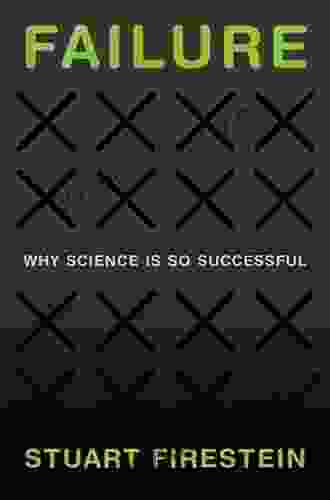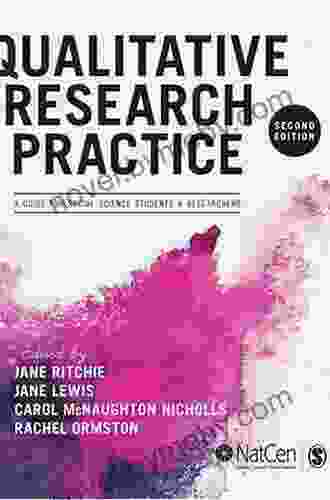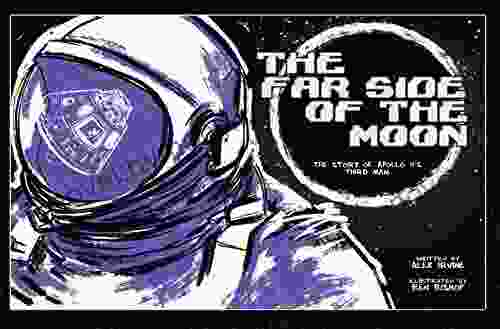Failure: Why Science Is So Successful

Science is often seen as a process of relentless progress, with scientists making one discovery after another. However, this is not the whole story. In fact, failure is a natural part of the scientific process. By embracing failure, scientists are able to learn from their mistakes and make progress.
4.7 out of 5
| Language | : | English |
| File size | : | 354 KB |
| Text-to-Speech | : | Enabled |
| Screen Reader | : | Supported |
| Enhanced typesetting | : | Enabled |
| Word Wise | : | Enabled |
| Print length | : | 303 pages |
| Lending | : | Enabled |
This book explores the role of failure in scientific discovery and innovation. It tells the stories of scientists who have failed time and time again, but who ultimately made important contributions to their fields. These stories show that failure is not something to be feared, but rather something to be embraced.
If you are a scientist, or if you are simply interested in the process of scientific discovery, then this book is for you. It will change the way you think about failure, and it will inspire you to take risks and pursue your dreams.
Table of Contents
- Chapter 1: The Nature of Failure
- Chapter 2: The Benefits of Failure
- Chapter 3: The Stories of Scientists Who Failed
- Chapter 4: How to Embrace Failure
- Chapter 5: The Future of Failure
Chapter 1: The Nature of Failure
Failure is a natural part of life. Everyone fails at some point, whether it's in our personal lives or our professional lives. Failure can be frustrating and discouraging, but it is also an opportunity to learn and grow.
In science, failure is particularly common. Scientists are constantly testing new ideas and hypotheses, and many of these experiments fail. This is not because scientists are incompetent, but rather because science is a process of trial and error. Scientists need to fail in Free Download to learn what works and what doesn't.
The key to successful failure is to learn from your mistakes. When you fail, take some time to reflect on what went wrong. What could you have done differently? What did you learn from the experience?
Once you have learned from your mistakes, you can move on and try again. Don't be afraid to fail, because failure is simply a stepping stone on the path to success.
Chapter 2: The Benefits of Failure
Failure can have a number of benefits, including:
- Failure can help you to identify your weaknesses. When you fail, you can see where you need to improve.
- Failure can help you to develop resilience. When you fail, you learn how to bounce back from setbacks.
- Failure can help you to be more creative. When you fail, you are forced to think outside the box and find new solutions.
- Failure can help you to be more persistent. When you fail, you learn that you can't give up on your dreams.
Failure is not something to be feared, but rather something to be embraced. It is an opportunity to learn, grow, and become more successful.
Chapter 3: The Stories of Scientists Who Failed
Throughout history, there have been many scientists who have failed time and time again, but who ultimately made important contributions to their fields. Here are a few examples:
- Thomas Edison failed over 10,000 times before he finally invented the light bulb.
- Alexander Fleming failed to develop a cure for syphilis, but he did discover penicillin, which has saved millions of lives.
- Marie Curie was rejected from the French Academy of Sciences, but she went on to win two Nobel Prizes.
These are just a few examples of the many scientists who have failed on the road to success. Their stories show that failure is not a sign of weakness, but rather a sign of perseverance.
Chapter 4: How to Embrace Failure
If you want to be successful, you need to be willing to fail. Here are a few tips on how to embrace failure:
- Change your mindset. Don't think of failure as something to be avoided, but rather as an opportunity to learn and grow.
- Set realistic goals. Don't set yourself up for failure by setting unrealistic goals. Start with small, achievable goals and work your way up to larger goals.
- Take risks. Don't be afraid to try new things, even if you're not sure if you'll succeed.
- Learn from your mistakes. When you fail, take some time to reflect on what went wrong. What could you have done differently? What did you learn from the experience?
- Don't give up. Failure is not a reason to give up. It's simply an opportunity to learn and grow.
Embracing failure is not easy, but it is essential for success. If you are willing to fail, you will be more likely to achieve your goals and make a difference in the world.
Chapter 5: The Future of Failure
In the future, failure will become even more important. As the world becomes increasingly complex, scientists will need to be more willing to take risks and try new things. Failure will be essential for driving innovation and solving the world's most pressing problems.
We need to create a culture of failure in which failure is seen not as something to be feared, but rather as something to be embraced. We need to teach our children that failure is not a sign of weakness, but rather a sign of perseverance. We need to encourage scientists to take risks and try new things, even if they are not sure if they will succeed.
Failure is not something to be feared, but rather something to be embraced. It is an opportunity to learn, grow, and make a difference in the world.
4.7 out of 5
| Language | : | English |
| File size | : | 354 KB |
| Text-to-Speech | : | Enabled |
| Screen Reader | : | Supported |
| Enhanced typesetting | : | Enabled |
| Word Wise | : | Enabled |
| Print length | : | 303 pages |
| Lending | : | Enabled |
Do you want to contribute by writing guest posts on this blog?
Please contact us and send us a resume of previous articles that you have written.
 Book
Book Novel
Novel Page
Page Chapter
Chapter Text
Text Story
Story Genre
Genre Reader
Reader Library
Library Paperback
Paperback E-book
E-book Magazine
Magazine Newspaper
Newspaper Paragraph
Paragraph Sentence
Sentence Bookmark
Bookmark Shelf
Shelf Glossary
Glossary Bibliography
Bibliography Foreword
Foreword Preface
Preface Synopsis
Synopsis Annotation
Annotation Footnote
Footnote Manuscript
Manuscript Scroll
Scroll Codex
Codex Tome
Tome Bestseller
Bestseller Classics
Classics Library card
Library card Narrative
Narrative Biography
Biography Autobiography
Autobiography Memoir
Memoir Reference
Reference Encyclopedia
Encyclopedia Richard Streatfeild
Richard Streatfeild Rocky Nielsen
Rocky Nielsen Sarah Helm
Sarah Helm Scott Weidensaul
Scott Weidensaul Richard Baldwin
Richard Baldwin Sally A Lipsky
Sally A Lipsky Rev Dr William J Barber Ii
Rev Dr William J Barber Ii Sue Kim
Sue Kim Susan Veness
Susan Veness Rick Bowers
Rick Bowers Ruby Raine
Ruby Raine Scott Davis Howard
Scott Davis Howard Richard Sale
Richard Sale Robert Dallek
Robert Dallek Tami Anastasia
Tami Anastasia Rita Naomi Moran
Rita Naomi Moran Robbin Gourley
Robbin Gourley Robyn Walker
Robyn Walker Tom Lewis
Tom Lewis Richard D Easton
Richard D Easton
Light bulbAdvertise smarter! Our strategic ad space ensures maximum exposure. Reserve your spot today!
 Theo CoxFollow ·14.1k
Theo CoxFollow ·14.1k Alexandre DumasFollow ·8.9k
Alexandre DumasFollow ·8.9k Jamison CoxFollow ·8.1k
Jamison CoxFollow ·8.1k Tom ClancyFollow ·7.1k
Tom ClancyFollow ·7.1k Hank MitchellFollow ·18.5k
Hank MitchellFollow ·18.5k Theodore MitchellFollow ·16.4k
Theodore MitchellFollow ·16.4k Kurt VonnegutFollow ·12.5k
Kurt VonnegutFollow ·12.5k Braeden HayesFollow ·2.9k
Braeden HayesFollow ·2.9k

 Mike Hayes
Mike HayesArthur Meighen: A Life in Politics
Arthur Meighen was one of Canada's most...

 Bryan Gray
Bryan GrayVindicated: Atlanta's Finest
In the heart of Atlanta, a...

 Houston Powell
Houston PowellHis to Defend: A Captivating Legal Thriller That Will...
An Unforgettable...

 John Green
John GreenUncover the Riveting Tale of "Hunted: Atlanta Finest" - A...
Prepare yourself for a...
4.7 out of 5
| Language | : | English |
| File size | : | 354 KB |
| Text-to-Speech | : | Enabled |
| Screen Reader | : | Supported |
| Enhanced typesetting | : | Enabled |
| Word Wise | : | Enabled |
| Print length | : | 303 pages |
| Lending | : | Enabled |
















